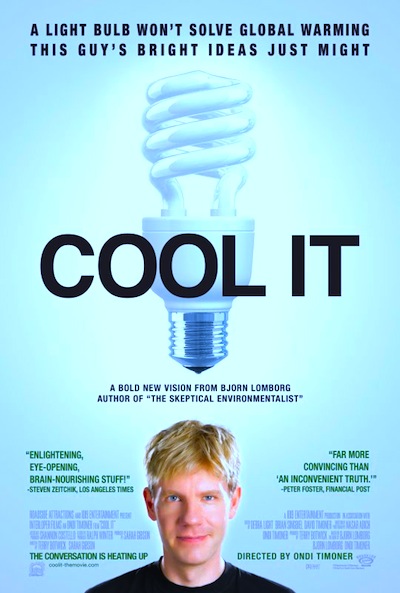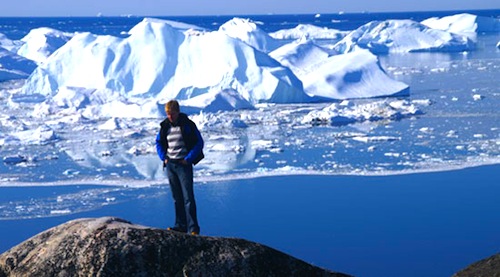By Joe Bendel. When did skepticism become a term of derision in the scientific community? In truth, Bjørn Lomborg is not a so-called global warming “denier.” He agrees the Earth’s overall temperature is rising, but he takes issue with some of the more inflated estimates. It seems Lomborg’s primary sin though, is his application of rigorous risk assessments and cost-benefit analysis to the global warming debate. Having been likened to Adolf Hitler (yes, seriously) by Dr. Rajendra Pachuari of the UN’s Intergovernmental Panel on Climate Change, Lomborg gets a chance to speak for what he considers the maligned middle ground of the warming debate in Ondi Timoner’s new documentary, Cool It, which opened this past Friday in select theaters nationwide.
 The Danish Lomborg always considered himself “lefter than left,” but when he chanced across an article by the late iconoclastic economist Julian Simon, his apostasy began. Simon argued, contrary to popular belief, that the state of the Earth was actually improving – in large measure due to the benefits of capitalist prosperity. Professor Lomborg took up the refutation of Simon’s book as a long-term class project, but his class found itself confirming far more than they contradicted. When he published their findings in his book The Skeptical Environmentalist, Lomborg’s name quickly became anathema to many of his academic colleagues.
The Danish Lomborg always considered himself “lefter than left,” but when he chanced across an article by the late iconoclastic economist Julian Simon, his apostasy began. Simon argued, contrary to popular belief, that the state of the Earth was actually improving – in large measure due to the benefits of capitalist prosperity. Professor Lomborg took up the refutation of Simon’s book as a long-term class project, but his class found itself confirming far more than they contradicted. When he published their findings in his book The Skeptical Environmentalist, Lomborg’s name quickly became anathema to many of his academic colleagues.
Indeed, the extent to which Lomborg has been vilified, even persecuted, for deviating from politically correct orthodoxy is simply scandalous. Yet the Dane appears to be a happy warrior, embracing the warming debate as the next great fight. In conceding the general warming premise, he glosses over many legitimate questions about the integrity of the data often sited. Yet, he still gives warming partisans fits. For instance, Lomborg is tacky enough to actually run the numbers on the Kyoto Protocols, finding that at a projected cost of $250 billion in lost GDP annually, the EU’s plan to cut emissions 20% below 1990 levels will only cool the planet a negligible 0.1 degrees F. That is an inconvenient truth.
Indeed, the Al Gore documentary takes it in the shines and the credibility throughout Cool. Not simply held up as an example of reckless scare-mongering, Lomborg eviscerates several of Gore’s claims that gained particular traction in the public consciousness, including the Hurricane Katrina canard. Perhaps the best example of Lomborg’s rigorous methodology comes courtesy of the poor polar bears supposedly jeopardized by global warming. According to Lomborg, at the cost of $250 billion annually, implementing Kyoto might save one single polar bear a year (whose population has been steadily increasing over the past several years). In contrast, he suggests those truly concerned about polar bears work to crack down on poachers who kill 250 to 300 each year.
Frankly, Lomborg lets his critics off easy, never really delving into why they generally oppose geo-engineering efforts to directly counteract the physically warming process. Instead, they only embrace command-and-control solutions that would have an enormously disruptive effect on our economy. Hmm, could it be the draconian “remedies” are really the goal in and of themselves? If someone really believed warming was a significant problem, would they not embrace a widely diversified set of solutions? Lomborg does.

While Cool is best when Lomborg is sawing Gore off at the knees, his third act flags somewhat. Though laudably intended to be constructive and positive, Lomborg’s whirlwind tour of scientific research and civil engineering projects he believes have cooling potential largely blur together into a montage of the Skeptical Environmentalist talking to people in lab coats. Still, his call-to-action takeaway that the EU’s $250 billion could be spent in ways far more beneficial to humanity and our planet is hard to dispute.
Though Cool claims Lomborg takes heat from both sides, judging from what viewers see in the film, it really only seems to come from the warming true believers. One can understand why they are upset, considering how incisively Lomborg critiques the Kyoto-style approach.
As documentary filmmaking though, Cool is quite conventional, employing run-of-the-mill graphics and talking head sound-bites. Indeed, it has nothing like the grungy, up-close-and-personal voyeurism of We Live in Public, Timoner’s documentary profile of internet pioneer Josh Harris. On the other hand, Lomborg is an exponentially more pleasant figure to spend time with. He also has a genuine knack for explaining and distilling complex concepts, which prevents the film from bogging down in jargon and Powerpoint. Breezy but informed and informative, Cool should challenge many preconceived notions about the warming controversy. It opened Friday in select theaters nationwide.
Posted on November 16th, 2010 at 7:13am.
I have a tendency to believe that global warming is real but not dire, so this seems right up my alley so far as confirming my beliefs. That usually makes it really unlikely that I’ll watch it, since I’m rarely interested in documentaries that confirm my beliefs as I’m more interested in ones that challenge my beliefs (without insulting them, ala Michael Moore). I may need to make an exception for this one though as it would be nice to be more educated on the discussion from a balanced point of view.
There’s a real global crisis going on right now and AGW is just one manifestation of it. Specifically, the politicization of science and the unintended consequences of tribalism and government funding. One can argue that science should be immune from such effects by it’s nature, but unfortunately, historical evidence proves otherwise. The Nazi’s “German Science”, the Communist’s Lysenko and of course the famous cigarette health research conducted by companies being paid by the tobacco industry.
Unlike attempting a computer model of a planet, modeling of the consequences of the politicization of science is pretty straightforward – eventual technological and scientific collapse.